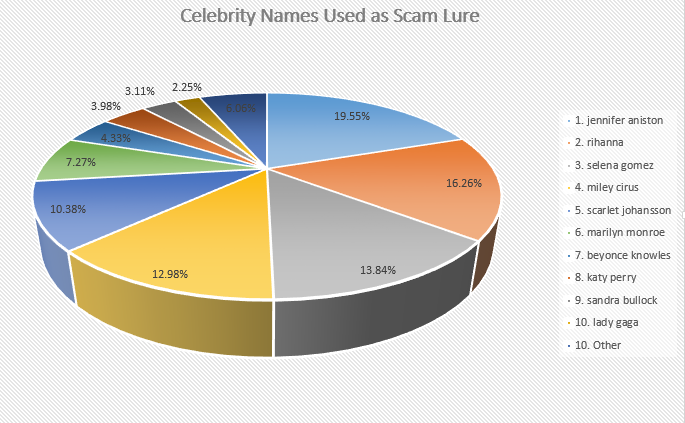Jennifer Aniston More Dangerous than Rihanna in Spam

Jennifer Aniston outshone Rihanna and Miley Cyrus in the eye of spammers, according to a Bitdefender study on the spam circulating in October and November 2013. Aniston is mentioned in 19 percent of spam messages that include celebrity names, followed by Rihanna with 16 percent and Selena Gomez at 13 percent.
Using trending celebrity names as bait is a common practice of scammers seeking to push fake surveys and dubious deals in junk e-mails. In some spam messages, scammers associate Aniston’s name with sexual content and a simple click on the link will grab users’ bank account credentials via a banker Trojan downloaded on their systems.
Rihanna, on the other hand, is mentioned in e-mails that lead to webpages with pornographic content and online shops selling accessories. The problem with these e-shops is that they are so low-profile that chances are no purchased item will ever reach users’ doorstep.
Spam e-mails with Selena Gomez advertise plastic surgery and free online concerts while leading to phishing websites that grab identification data of gullible users. Justin Bieber’s name is associated with indecent messages hinting at sex, nudity and scandals.
Miley Cyrus, Scarlet Johansson, and Marilyn Monroe, Katy Perry, Beyonce Knowles, Sandra Bullock and Eminem are other glam names are used in scam campaigns.
Users’ curiosity gets them in trouble as attention-grabbing headlines are eternally a successful strategy to draw users into surveys to seek private data and maintain the profitable business of scam and spam.
Apart from celebrities, the Bitdefender analysis revealed that movies too make a good spam lure for curious users. Gravity is the top choice, followed by 12 Years a Slave, Insidious and The Avengers.
The abuse goes so far that sometimes, celebrities are declared dead and allegedly photographed beaten or involved in hideous sex scandal. The messages promise scandalous pictures or videos only to make users open attachments and click links to infect their devices with malware, expose them to inappropriate content or steal sensitive into right under people’s noses.
The proper thing to do when an e-mail promising scandal reaches your inbox, is to delete it. Don’t act on your curiosity with unsolicited e-mails. They never bring good news.
This article is based on the spam samples provided courtesy of Ionut›-Daniel RA‚ILEANU, Bitdefender Spam Researcher.
All product and company names mentioned herein are for identification purposes only and are the property of, and may be trademarks of, their respective owners.
tags
Author
A blend of product manager and journalist with a pinch of e-threat analysis, Loredana writes mostly about malware and spam. She believes that most errors happen between the keyboard and the chair.
View all postsRight now Top posts
How to Protect Your WhatsApp from Hackers and Scammers – 8 Key Settings and Best Practices
April 03, 2025
Outpacing Cyberthreats: Bitdefender Together with Scuderia Ferrari HP in 2025
March 12, 2025
Streamjacking Scams On YouTube Leverage CS2 Pro Player Championships to Defraud Gamers
February 20, 2025
How to Identify and Protect Yourself from Gaming Laptop Scams
February 11, 2025
FOLLOW US ON SOCIAL MEDIA
You might also like
Bookmarks








